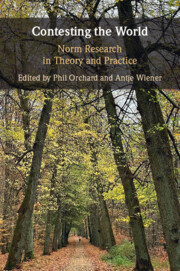Book contents
- Contesting the World
- Contesting the World
- Copyright page
- Contents
- Figures
- Tables
- Contributors
- Abbreviations
- 1 Introduction
- Part I Norm Strength, Collisions, and Conflicts
- 2 Rethinking Norm Change
- 3 Understanding and Resolving Norm Conflict
- 4 Norm Research on Conflictive Norm Relations
- Part II Development of the Field
- Part III Meta-theorising, Linkages, and International Law
- Part IV Dimensions of Norm Contestation
- References
- Index
2 - Rethinking Norm Change
Content and Strength in Norm Development
from Part I - Norm Strength, Collisions, and Conflicts
Published online by Cambridge University Press: 01 November 2024
- Contesting the World
- Contesting the World
- Copyright page
- Contents
- Figures
- Tables
- Contributors
- Abbreviations
- 1 Introduction
- Part I Norm Strength, Collisions, and Conflicts
- 2 Rethinking Norm Change
- 3 Understanding and Resolving Norm Conflict
- 4 Norm Research on Conflictive Norm Relations
- Part II Development of the Field
- Part III Meta-theorising, Linkages, and International Law
- Part IV Dimensions of Norm Contestation
- References
- Index
Summary
Dominant approaches to norm development have shaped and limited the direction and impact of the norm research programme. While early work tended to characterise norm development in relatively teleological and progressive terms, more recent work has explored how a norm’s meaning changes through processes of interpretation, contestation, and violation. In spite of this important corrective and the rich debates that have emerged from it, understandings of norm development have continued to be hampered by a focus on behavioral measures and on changes in norm content. As a result, approaches to norm development remain incomplete, most notably in their neglect of norm strength. To address these shortcomings, this chapter critically reviews existing scholarship on norm change and development, highlighting the need to consider norm content and norm strength as distinct and constitutive elements in processes of norm development. The chapter proposes a typology that identifies four forms of norm change, along with an updated conceptual framework for understanding norm development. This conceptual framework overcomes existing conceptual gaps and inconsistencies in the study of norm processes. In so doing, it promises to advance existing theoretical debates, open new directions of inquiry, and contribute to the further accumulation of knowledge about international norms.
Keywords
- Type
- Chapter
- Information
- Contesting the WorldNorm Research in Theory and Practice, pp. 29 - 42Publisher: Cambridge University PressPrint publication year: 2024

